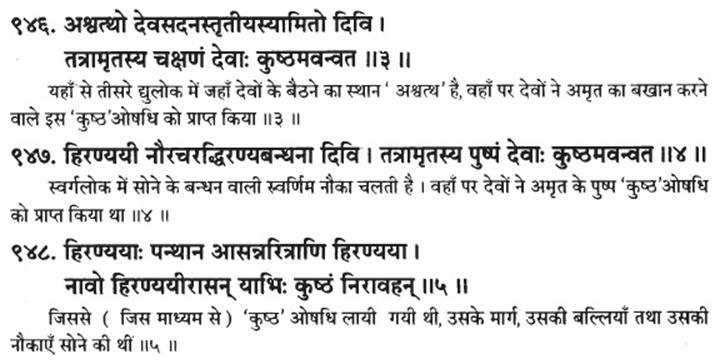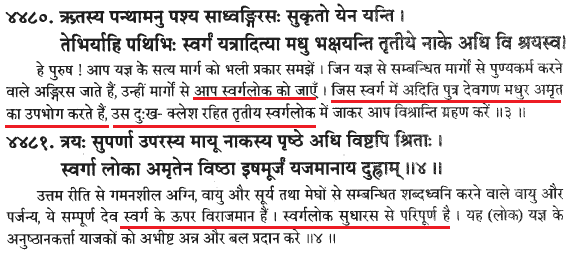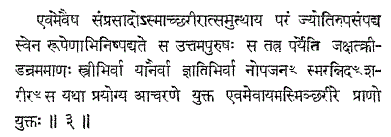Vedic Paradise: The Inside Story

Written by Ibn Muhammad
We have already seen in my previous article Vedic Paradise: An Overview, that Vedic Paradise is a distinct place where only joy is found and it is physical. I will now present before you the internal scene of the Vedic Paradise based on Vedic texts and other authentic scriptures.
Scene 1: The trees and flowers of Vedic Paradise

3. “In the third heaven above us stands the Asvattha tree (Banyan tree i.e. Ficus Religiosa), the seat of gods. There the gods sought the Kushtha Plant, embodiment of endless life.”
4. “There moved through heaven a golden ship, a ship with cordage wrought of Gold. There the Gods won the Kushtha Plant, the blossom of eternal life.”
5.”They sailed on pathways paved with gold, the oars they piled were wrought of gold: All golden were the ships wherein they carried Kushtha down to earth.” [Atharvaved Kaand 5; Sookt 4; Mantras 3-5]
It is clear from these mantras that Vedic Paradise contains the Banyan tree and the Kushtha plant. The fruit of Banyan will feed the people of Vedic Paradise and juice of the Kushtha plant will be their drink.
Scene 2. The beverages of Vedic Paradise
 “Make me immortal in that realm where dwells the King, Vivasvat’s Son (i.e Yama), where is the secret shrine of heaven, where are those waters young and fresh. Flow, Indu, flow for Indra’s sake.” [Rigveda Mandal 9; Sookt 113; Mantra 8]
“Make me immortal in that realm where dwells the King, Vivasvat’s Son (i.e Yama), where is the secret shrine of heaven, where are those waters young and fresh. Flow, Indu, flow for Indra’s sake.” [Rigveda Mandal 9; Sookt 113; Mantra 8]

“Look you happily along the road of righteousness, by which go the Angiras, well doers; by those paths go you to heaven, where Adityas feed on honey; that sorrowless world, spread you out upon the third heaven.” [Atharvaved 18:4:3-4]
 “What Fathers of yours went away earlier and what later, for them let there go a brook of ghee, hundred-streamed, overflowing.” [Atharvaved 18:3:72]
“What Fathers of yours went away earlier and what later, for them let there go a brook of ghee, hundred-streamed, overflowing.” [Atharvaved 18:3:72]
 “Full lakes of butter with their banks of honey, flowing with wine, and milk and curds and water, abundant with their overflow of sweetness, these streams shall reach you in the world of Svarga, whole lakes with lotus-blossom shall approach you.” [Atharvaved 4:34:6]
“Full lakes of butter with their banks of honey, flowing with wine, and milk and curds and water, abundant with their overflow of sweetness, these streams shall reach you in the world of Svarga, whole lakes with lotus-blossom shall approach you.” [Atharvaved 4:34:6]
Here, the word Sura (सुरा) has been used, which undoubtedly means wine, according to all Sanskrit lexicons. Chandogya Upanishad also throws light on this.

“..Ara and Nya are two lakes in the world of Brahman, in the third heaven from hence; and there is the lake Airam madiya…” [Chandogya Upanishad – Prapathak 8; Khanda 5; Mantra 3]
Commenting on this, Sri Sankara says,
“There is also the lake Airam madiya, ‘Aira‘ is guel, ‘ira” being grain and that which is full of this gruel, and serves to intoxicate or exhilirate those that partake of it.”
The study of Vedas reveals that during the Vedic period, wine was offered to the devatas and was known as Sura Archan. For example Atharvaved 10:6:5

“Before it (the amulet [1] as a guest) ghee, surâ (liquor), honey, and every kind of food we place. The amulet having gone to the gods shall, as a father for his sons, plan for us growing good, more and more day after day!”
It means that the ghee, liquor and honey that we present in the name of the devatas will be presented to us in Vedic Paradise. Nevertheless, Vedas clearly mention that streams of ghee, milk, curd, wine and honey will be attained by the inmates of Vedic Paradise. Other scriptures such as the Upanishads and the Brahmanas affirm the same. We also saw that during the Vedic Period, liquor was not considered abhorrent and was offered to the gods. Indra was often invited to consume liquor mixed with Soma. For example see Yajurved Adhyay 21; Mantra 60.

“To-day the divine Vanaspatî has done good service to the Asvins with a goat, to Sarasvatî with a ram, to Indra with a bull. They have eaten these from the marrow onwards, they have accepted the cooked viands, they have waxed strong with the rice-cakes. The Agnis, Sarasvatî, and Indra have drunk the wine and Soma draughts.”
Scene 3. The Musicians and Musical Instruments of Vedic Paradise
Vedic Paradise is a world of ultimate desires and tastes. So far we have seen the tastes in food and drink. Let us now turn to another Vedic luxury.

“Never does want or evil fortune visit those who prepare oblation called Vishtāri. He goes unto the Gods, he dwells with Yama, he joys among Gandharvas meet for Soma.” [Atharvaved 4:34:3]
![]() The word Gandharva that occurs in this mantra is worth attention. People who inherit Vedic Paradise will enjoy among the Gandharvas. Sanskrit lexicons as well as Vedic study tells us that these Gandharvas are beautiful singing men with long hair. Arya Samaj considers Gandharvas not as a heavenly singers but Vedic scholars. However, this is an erroneous view as the features of Gandharvas mentioned in the Vedas do not resemble Vedic scholars. For example,
The word Gandharva that occurs in this mantra is worth attention. People who inherit Vedic Paradise will enjoy among the Gandharvas. Sanskrit lexicons as well as Vedic study tells us that these Gandharvas are beautiful singing men with long hair. Arya Samaj considers Gandharvas not as a heavenly singers but Vedic scholars. However, this is an erroneous view as the features of Gandharvas mentioned in the Vedas do not resemble Vedic scholars. For example,
- The wives of Gandharvas are called Apsaras (beautiful celestial maidens). [See Athavaved 2:2:4, They dance to the music made by their husbands. Urvasi, Menaka, Rambha and Tilottama are the most famous among them. For example see Atharvaved 2:2:5

2) Gandharvas identified as distinct from humans

No mortal beings slay him, no Gāndharvas, no Apsaras; O’er all the regions he is king, the man who wears this Amulet. [Atharvaved 8:5:13]
3) Gandharvas are lovers of women and chased women if they found them attractive.

“Youthful, completely decked with hair, one monkey-like, one like a dog,— So the Gandharva, putting on a lovely look, pursues a dame. Him with an efficacious charm we scare and cause to vanish hence.” [Atharvaved 4:37:11]
All these mantras show that Gandharvas are distinct creatures from humans. In Sanskrit lexicons Gandharva means a heavenly singer, a celestial musician. Even Swami Dayanand Saraswati was compelled to write the known meaning of Gandharva in his translation, even though he has heavily twisted Vedic verses. For example, see Yajurveda 30:8, and 12:99.
We also find many other things in Vedas about Gandharvas, which are so obscene that they cannot be produced here.
The heavenly musical melodies and musicians have also been mentioned by Chandogya Upanishad 8:2:8

“And he who desires the world of song and music, by his mere will song and music come to him, and having obtained the world of song and music, he is happy.”
Scene 4: The Ultimate luxuries in Vedic Paradise- Hordes of maidens and beautiful women
It is mentioned in Rigveda 9:113:11

“Make me immortal in that realm where happiness and transports, where Joys and felicities combine, and longing wishes are fulfilled. Flow, Indu, flow for Indra’s sake.”
In this mantra, there is a mention of fulfillment of KAMA (sexual) desires. This mantra also mentions three levels of joy and pleasure viz. Mod (मोद), Mud (मुद) and Pramud (प्रमुद). Let us analyze these three words in the light of Sanskrit lexicons and Vedas. These three words and their derivatives occur more or less 40 times. For example,

“Those in which Soma joys and is delighted, as a young man with fair and pleasant damsels. Go you to those Waters, O Adhvaryu, and purify with herbs what you infuse.” [Rigveda 10:30:5]

“I will not fold mine arms about thy body: they call it sin when one comes near his sister. Not me,-prepare your pleasures with another: your brother seeks not this from you, O fair one.” [Rigveda 10:10:12]
From these references we come to know that although all three words Mod (मोद), Mud (मुद) and Pramud (प्रमुद) denote the intimate joy between a man and woman, however, the word Pramud (प्रमुद) especially denotes sexual intimacy in the Vedas as used in Rigveda 10:10:12, Atharvaved 18:1:13, and Yajurved 30:10. Other than this meaning it has no other meaning in the Vedas. Even Swami Dayanand Saraswati has interpreted Pramud as sexual intercourse in Yajurved 30:10.
According to the Vedas, humans who inherit Paradise will enter it with all their organs. One particular verse is produced here

“If Agni Jātavedas, as he bore you hence to the Fathers’ world, had left one single limb of your bodies, here do I restore it. Fathers, rejoice in heaven with all your organs!” [Atharvaveda 16:4:64]
So the private organs will be there in Vedic Paradise. Supporing this view Shatpath Brahman
Kaand 10, Adhyay 4, Brahaman 4, Kaandika 4 says,
“Wherefore let him who knows this by all means practise austerities; for, indeed, when he who knows this practises austerities, even to (abstention from) sexual intercourse, every (part) of him will share in the world of heaven”
It is clear from these mantras that sexual powers will be present in Vedic Paradise. Now the question is how and for what will these powers be used in Vedic Paradise. Atharvaved 4:34:2 answers this question as,

“Boneless, pure, cleansed with the wind, brilliant, they go to a brilliant world. The fire does not burn their male organ. In Swarga they get plenty of women.” [Atharvaved 4:34:2]
This mantra strikes a death blow to all those so-called Brahmacharis who sweat at the mere mention of women in Paradise, fearing that this will violate their Dharma. Vedas reject such apprehensions. There will not be just one, but numerous women to fulfill the desire of sex. In this mantra, the word Strenam (सत्रैणम) is used which means ‘a collection of women’. This is the meaning given by the ancient Indian Grammarian Panini in his book Ashtadhyayi – Adhyay 4; Paad 1; Sootr 87. Lest any Arya Samji tries to do some word gymnastics as they are so renowned for, we have given this source. Also the word Shishan (शिशन) used in this mantra only means ‘phallus’ according to Nirukt 4:19.
These beautiful women which the people of Vedic Paradise will receive, are called as Apsaras in Vedic terminology. At many places in the Vedas, prayers are made to get these Apsaras. For example, see Atharvaved 2:2:5 that I have already quoted. Vedas also list many types of Apsaras. Six types of Apsaras are spoken of in Rigveda 10:95:6 and Atharvaved 8:10:27,28 and the details about them can be found in many references of the Upanishads. A some places they are called as the Lovers of Devatas. For example in Atharvaved 6:118:3 it is said

“My creditor, the man whose wife I visit, he, Gods! whom I approach with supplication, Let not these men dominate me in speaking. Mind this, you Apsaras, Gods’ Consorts!
The authentic Upanishads also mention about numerous women being given in Paradise. Chandogya Upanishad 8:12:3 says

“Thus does that serene being, arising from this body, appear in its own form, as soon as it has approached the highest light. He is the highest person (uttama purusha). He moves about there laughing, playing, and rejoicing, be it with women, carriages, or relatives, never minding that body into which he was born.”
Here also we find a subtle similarity with Rigveda’s three forms of enjoyment. Some will laugh with women, some with play with women and others will rejoice (?) with them. This perfectly explains what Mod (मोद), Mud (मुद) and Pramud (प्रमुद) denote. In this Upanishad the ultimate enjoyment is called Rammanah (रममाणः). This word is derived from Ramah which means that pleasure which is generated by the affinity between a man and woman. NIrukt, speaking about this word says that Ramah is a woman only for enjoyment and not for any sacred purpose (Nirukt 12:13).
Katha Upanishad narrates a dialogue between Yama and Nachiketas, the son of Vahasrava. Yama offers Nachiketas three boons. The first two boons are granted by Yama, the third however disturbs Yama, so Yama tries to bargain. Yama says,

“Whatsoever objects of desire are difficult to obtain in the realm of mortals, ask them all as thou desire; these lovely maidens with their chariots and musical instruments, such as are not obtainable by mortals–be served by these whom I give to thee. O Nachiketas, do not ask regarding death.”
Here also, like Rigved and Chadogya Upanishad, three classes of women are given.
Conclusion
Arya Samaj from its very birthday has indulged in making fun of the beliefs of other religions and considered belittling others as the only way to feel superior. They often make fun of the Islamic concept of Paradise but forget to read their own books. This attitude of theirs reminds me of a very wise saying of Jesus Christ (peace be upon him) who said,
“Why do you see the piece of sawdust in your brother’s eye and not notice the wooden beam in your own eye? [Matthew 7:3]
FOOTNOTES
[1] Arya Samaj translate the word mani (मणि) as God. However, according to Sayanacharya’s commentary it means an amulet.

